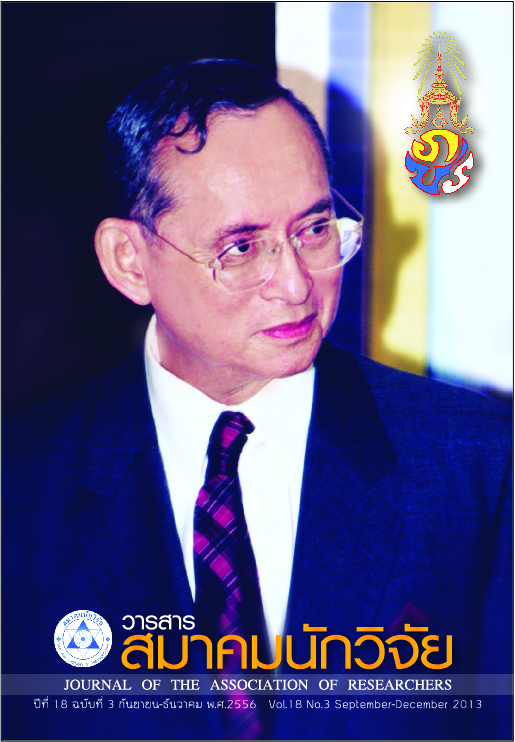The Integration of Local Knowledge and Wisdom of Ratchathani Asok Community, Ubon Ratchathani: A Proposal of a New Model for a Community of Learning
Main Article Content
Abstract
During the past several decades, Thailand has emphasized economic growth and ignored the
importance of indigenous knowledge and local wisdom. As a result, communities in general are facing
moral and ethical problems, health problems, environmental problems, and problems in their way of life
and self-reliance. With this concern, this research aims to study the local knowledge and wisdom of
the Ratchathani Asoke Community, and to propose a new model for learning in the community. This
research uses the qualitative research method. The data was collected by questionnaires, in-depth
interviews, and observations. The informants were the community leader, learning exchange facilitators,
supporters for learning in general, community members, and visitors. This research was conducted
from 2010 to 2012 . As a result of this research, this new model for learning called for harmonious
cooperation between community, temple and schools. Such cooperation relied on two input factors,
namely (1) sources of knowledge such as community organizations and media, and (2) sources of local
wisdom, found in specific people and various activities. This new model had many learning processes
through real experience. Through these learning processes, people accumulated knowledge,
and transformed it into intellectual power which helped them when encountering problems which occurred
in life. Community development consists of group activities, personal development, screening
of knowledge from outside the community, cooperation in taking care of children, elderly, and people
in ill health, adaptation of locally suitable concepts with appropriate development of the community.
Article Details
บทความที่ปรากฏในวารสารนี้ เป็นความรับผิดชอบของผู้เขียน ซึ่งสมาคมนักวิจัยไม่จำเป็นต้องเห็นด้วยเสมอไป การนำเสนอผลงานวิจัยและบทความในวารสารนี้ไปเผยแพร่สามารถกระทำได้ โดยระบุแหล่งอ้างอิงจาก "วารสารสมาคมนักวิจัย"
References
กระทรวงเกษตรและสหกรณ์, สำนักงานเศรษฐกิจการเกษตร เขต 5 (2549). การประเมินเชิงศึกษาเศรษฐกิจพอเพียงจากปราชญ์ชาวบ้าน กรณีศูนย์ฝึกราชธานีอโศก. อุบลราชธานี : ศูนย์ฝึกอบรมราชธานีอโศก.
ชาย โพธิสิตา. (2550). ศาสตร์และศิลป์แห่งการวิจัยเชิงคุณภาพ. กรุงเทพมหานคร: อมรินทร์ พริ้นติ้ง
ทรงคุณ จันทจร. (2544). การถ่ายทอดภูมิปัญญาพื้นบ้านเรื่องทรัพยากร ดิน น้ำป่าไม้ของกล่มุ ชาติพันธ์กุ ะเลิง. วิทยานิพนธ์ปริญญาดุษฎีบัณฑิต: มหาวิทยาลัยมหิดล.
ทรงศิริ สาประเสริฐ. (2541). ลักษณะการถ่ายทอดความรู้ของภูมิปัญญาชาวบ้าน. วิทยานิพนธ์ปริญญาศิลปศาสตรมหาบัณฑิต : มหาวิทยาลัยมหิดล.
บุญชม ศรีสะอาด. (2531). รูปแบบการสอนวิธีการทางสถิติสำหรับการวิจัยที่มีประสิทธิภาพ. มหาสารคาม : ปรีดีการพิมพ์.
ประดินันท์ อุปรมัย. (2549). “กระบวนการเรียนรู้ภูมิปัญญาไทยในรูปแบบการเรียนรู้ตามอัธยาศัย ในจังหวัดจันทบุรี:การทำสวนทุเรียน”. วารสารสุโขทัยธรรมาธิราช, 19(1), 71-78.
พจนา เอื้องไพบูลย์. (2546). การพัฒนารูปแบบกระบวนการเรียนรู้ในชุมชนเพื่อการพัฒนาที่ยั่งยืน : การศึกษาแบบ
พิทยา ว่องกุล. (2540). คำประกาศอิสรภาพจาก IMF. กรุงเทพมหานคร: อมรินทร์พริ้นติ้ง.
พระไตรปิฎกภาษาไทยฉบับหลวง. (2525). อรรถกถา อังคุตตรนิกาย นวกนิบาต ปัณณาสก์ สัมโพธ พลสูตร เล่มที่ 23.กรุงเทพมหานคร : โรงพิมพ์กรมการศาสนา.
วรรณา เลิศวิจิตจรัส และอรพิณ ชูเกาะทวด. (2549). นานาเรื่องราวการจัดการความรู้. กรุงเทพมหานคร: บีมแอดเวอร์ไทซิ่ง.
วราภรณ์ หลวงมณี. (2544). การจัดการสารสนเทศภูมิปัญญาชาวบ้านของเครือข่ายปราชญ์ชาวบ้านภาคอีสาน.วิทยานิพนธ์ปริญญาศิลปศาสตรมหาบัณฑิต : มหาวิทยาลัยขอนแก่น
วิจารณ์ พานิช. (2554). “ทำความรู้จัก KM ทศานุภาพของการจัดการความรู้”, KM สำนักงบประมาณ.ค้นเมื่อ 14, กรกฎาคม 2554. จาก http://www.bb.go.th/bbkm/content.asp?option=viewdetail&ifmid.
วุฒิชัย อ่องนาวา. (2552) “ปรัชญาญาณวิทยา”, ปรัชญาและศาสนา. ค้นเมื่อ 14, ธันวาคม2552. จาก http://saengtham.wordpress.com/philosophy
ศิรานุช อ่อนอ้น. (2548). กระบวนการเรียนรู้และถ่ายทอดภูมิปัญญาการรักษาสุขภาพของชาวไทเขิน : กรณีศึกษาบ้านป่าไผ่ หมู่ที่ 4 ตำบลช่อแล อำเภอแม่แตง จังหวัดเชียงใหม่. วิทยานิพนธ์ปริญญาศิลปศาสตรมหาบัณฑิต: มหาวิทยาลัยราชภัฏเชียงใหม่.
เสรี ซาเหลา และเรืองยศ จันทรคีรี. (2544). กระบวนการเรียนรู้ของประชาชน คือ แนวทางพัฒนา ชุมชนและวิกฤตชาติ. นครสวรรค์ : วิถีการพิมพ์.
เสรี พงศ์พิศ. (2532). ความหวังใหญ่ของสระคูณ. กรุงเทพมหานคร: เจริญวิทย์การพิมพ์.
Bandura, A. (1986). Social foundations of thought and action: A social cognitive theory. Englewood Cliffs, NJ: Prentice-Hall.


